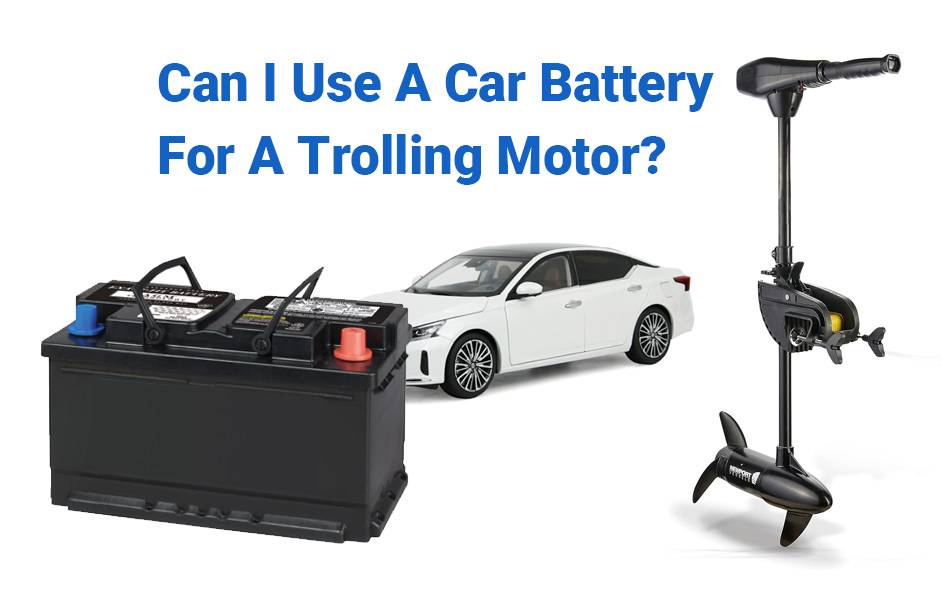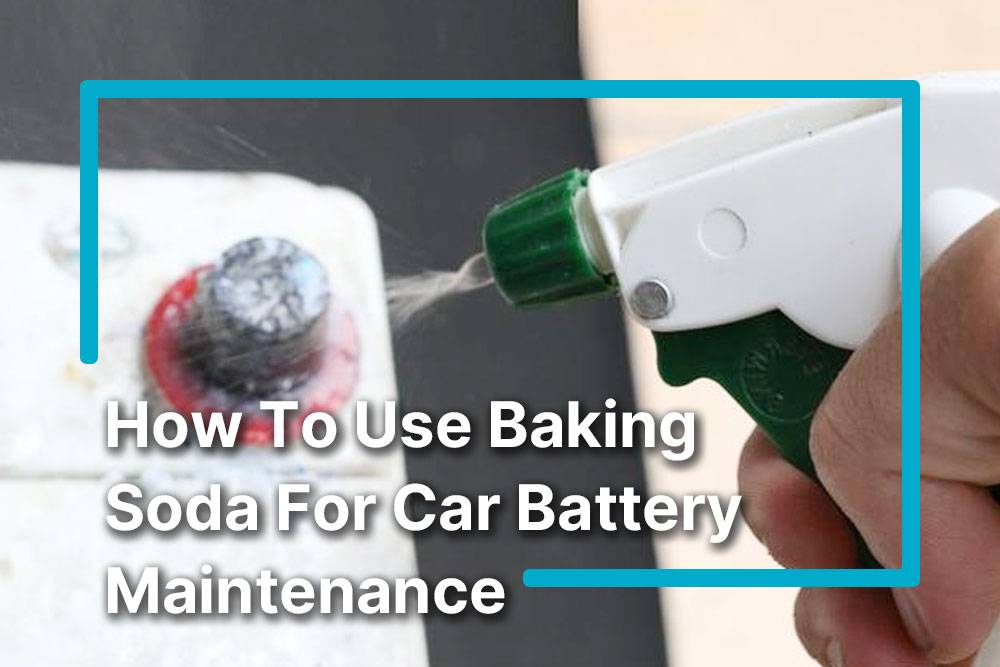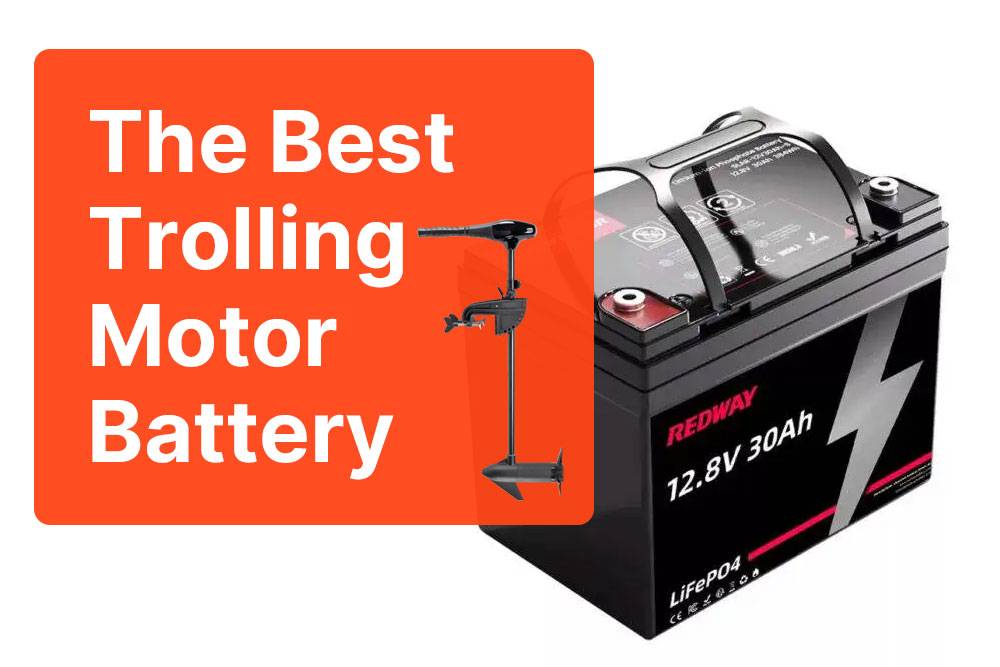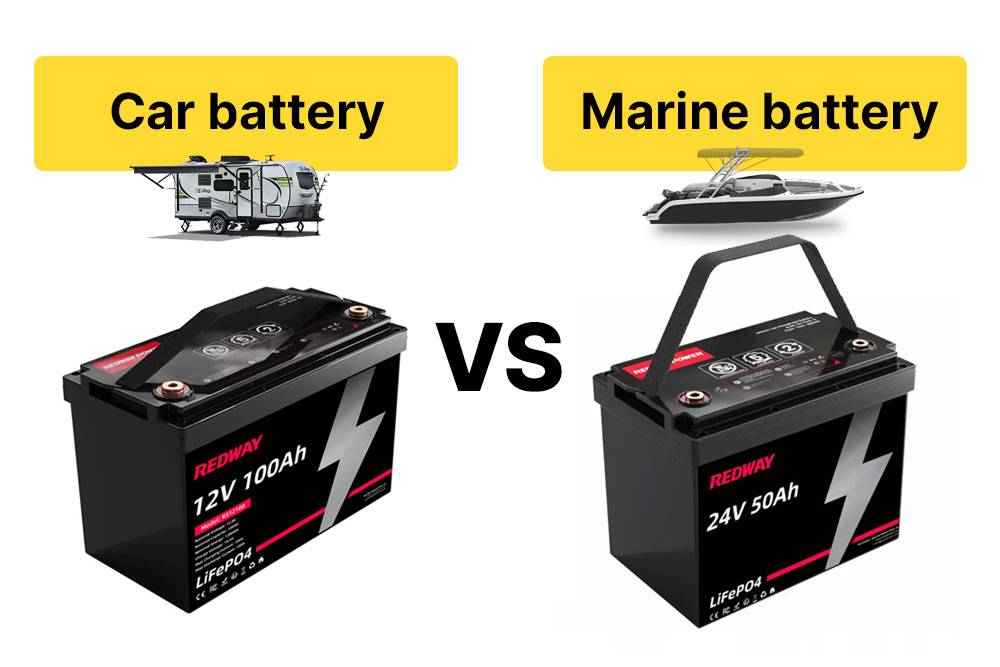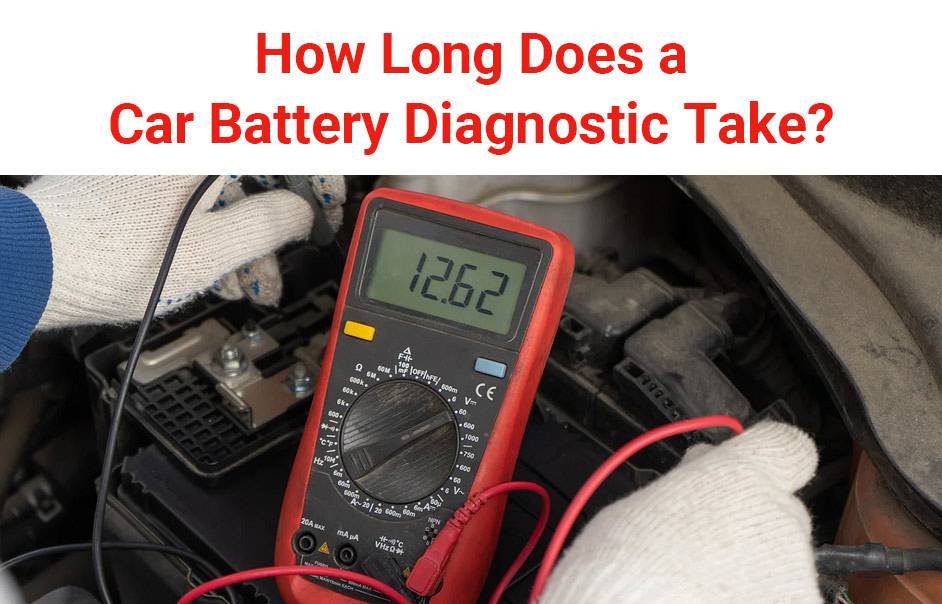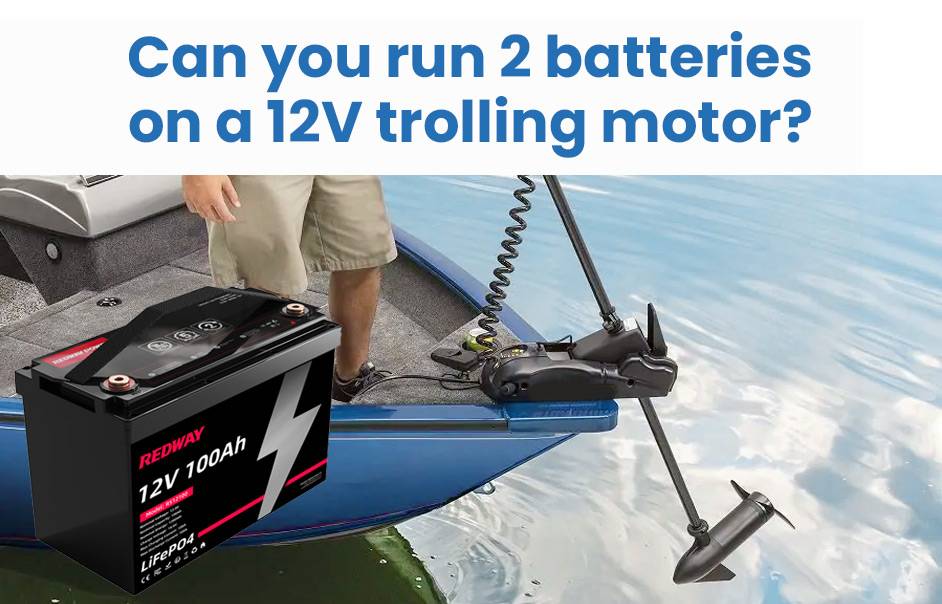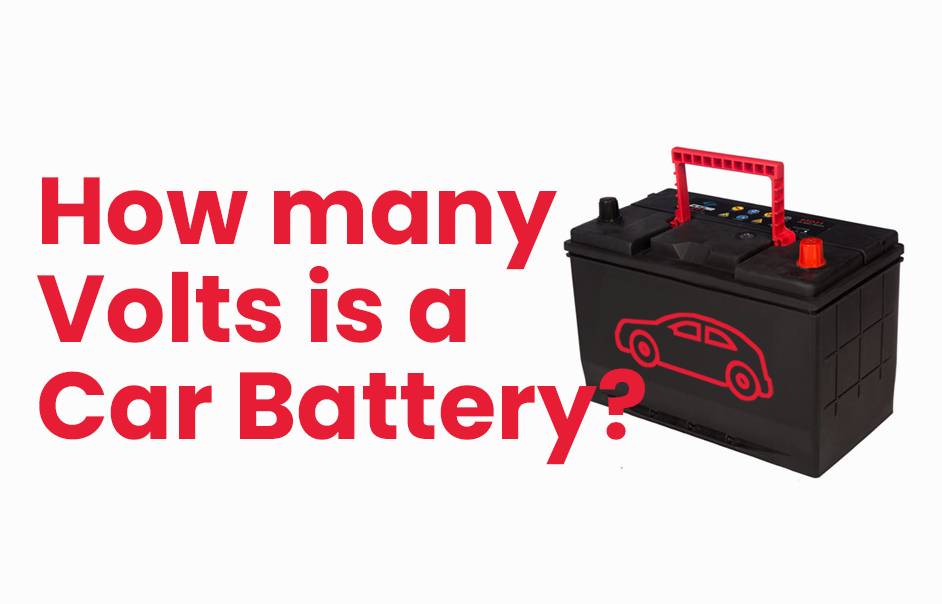Trolling motors play a crucial role for anglers, offering quiet and efficient boat propulsion. However, the choice of power source often raises questions, with some considering the use of a car battery instead of a marine battery. In this blog post, we’ll navigate the realm of trolling motor power and investigate the viability of using a car battery. So, fasten your seatbelts (or should I say “battery straps”) as we unravel the truth behind this electrifying question!
Understanding the differences between car batteries and marine batteries
Understanding the differences between car batteries and marine batteries is crucial for powering your trolling motor effectively. Here’s a simplified breakdown:
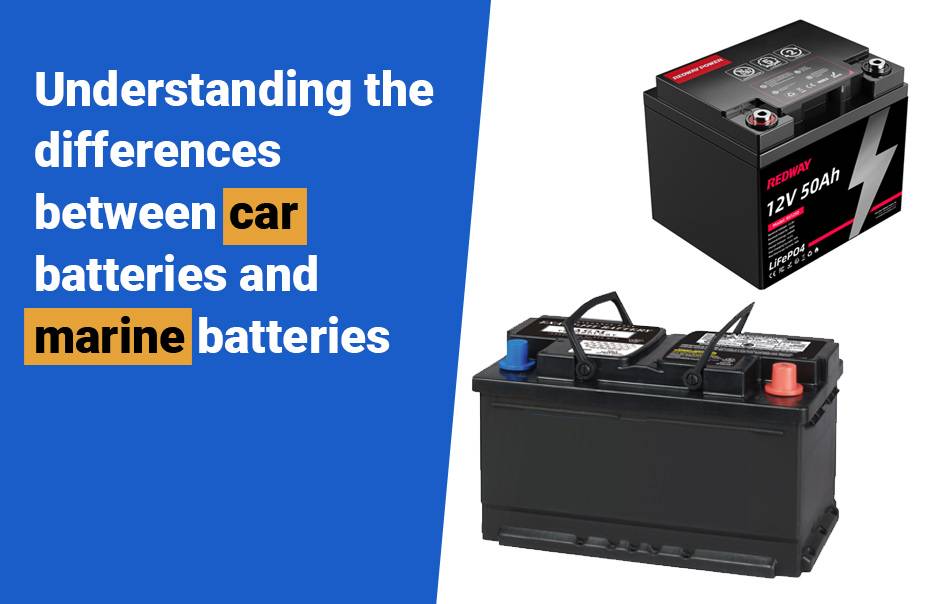
- Car Battery Characteristics: Car batteries are designed for quick bursts of power during engine starts. They have thinner plates and smaller cells, optimized for rapid energy release and swift recharging by the alternator.
- Marine Batteries for Deep Cycling: Marine batteries are specifically crafted for deep cycling, making them ideal for trolling motors. Thicker plates and larger cells enable steady power delivery over extended periods, suitable for continuous discharging and recharging cycles.
- Issues with Using Car Batteries: Opting for a car battery for your trolling motor poses problems. Car batteries lack the durability for constant deep cycling, resulting in a significantly shorter lifespan. Moreover, their quicker discharge under load makes them less suitable for trolling motors.
- Safety Concerns: Safety is paramount, especially on water. Inappropriate equipment, like using a car battery, can pose risks, affecting connected electronics on your boat. It’s crucial to prioritize safety when choosing the right battery.
In conclusion, while using a car battery might seem tempting, investing in a high-quality marine battery designed for deep cycling ensures optimal performance and longevity for your trolling motor setup. Choose wisely for a reliable and safe boating experience.
The potential risks of using a car battery for a trolling motor
- Different Design Purposes: Car batteries are engineered for short bursts of high energy to start an engine, while marine batteries, designed with deep cycling capabilities, are better suited for consistent, extended power delivery required by trolling motors.
- Limited Capacity and Safety Risks: Car batteries have limited capacity, making them susceptible to quick drainage by power-hungry trolling motors. Safety risks include inadequate ventilation for boat conditions, potentially leading to gas buildup or corrosive acid leakage.
- Voiding Warranties and Insurance Coverage: Using a car battery for a trolling motor may void warranties or insurance coverage. Manufacturers recommend specific marine-grade batteries to ensure optimal performance and safety.
Using a car battery for your trolling motor may seem convenient, but understanding the design differences and associated risks highlights the importance of investing in a dedicated marine battery for reliable, safe, and efficient operation.
Factors to consider when choosing a battery for your trolling motor
- Choose the Right Type:
- Opt for marine batteries over car batteries for trolling motors, as they are designed for prolonged use and deep cycling.
- Consider Amp-Hour Rating:
- Look for batteries with higher amp-hour ratings for longer-lasting power during your fishing trips.
- Prioritize Size, Weight, and Type:
- Select compact, lightweight marine batteries that fit trolling motor compartments, and decide between FLA, AGM, or Li-ion based on cost, maintenance, and performance considerations.
By keeping these factors in mind, you’ll make a well-informed decision, ensuring your trolling motor runs smoothly during all your fishing adventures!
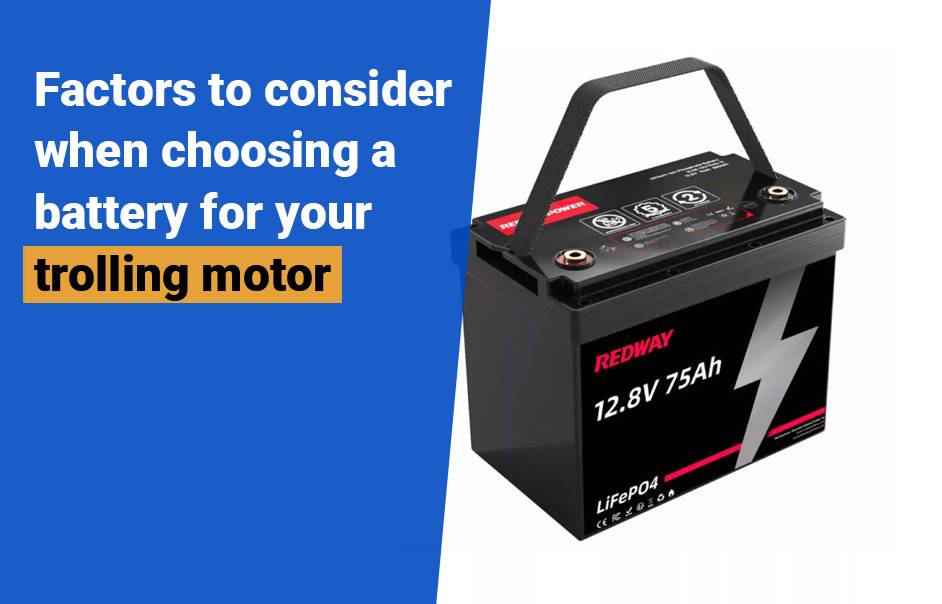
Alternatives to using a car battery for a trolling motor
When it comes to powering your trolling motor, alternatives to relying on a car battery can offer better performance and longevity. Despite the convenience and lower cost of car batteries, exploring other options tailored for marine applications can enhance your boating experience. Let’s delve into these alternatives and discover the optimal choices for consistent power, efficiency, eco-friendly charging, and reliable performance.
- Marine Batteries for Consistent Power:
- Opt for marine batteries with deep-cycle technology designed for steady, prolonged use with trolling motors, offering better performance than car batteries optimized for short bursts.
- Lithium-Ion Batteries for Efficiency:
- Consider lithium-ion batteries, despite their higher initial cost, for advantages such as longer lifespan, faster charging, higher energy density, and lower maintenance requirements.
- Solar-Powered Systems for Eco-Friendly Charging:
- Embrace solar-powered systems with panels to trickle charge trolling motor batteries, providing an environmentally friendly option and reducing reliance on conventional power supplies.
- AGM or Gel Cell Batteries for Sealed Reliability:
- Explore sealed lead-acid options like AGM or gel cell batteries, eliminating spill or leak concerns while ensuring reliable performance and deep cycling capabilities.
Choosing the right alternative depends on factors like boat size, usage frequency, desired runtime, and budget constraints. Thoroughly evaluate each option to ensure optimal performance and equipment lifespan, moving beyond the convenience of using a car battery for your trolling motor!
How to properly care for and maintain marine batteries
1. Charging:
- Use a charger specifically designed for marine batteries to prevent overcharging or undercharging, which can lead to damage or reduced lifespan.
2. Storage:
- Store the battery in a cool, dry place away from direct sunlight when not in use, and keep it fully charged during storage periods.
3. Cleanliness:
- Regularly inspect and clean battery terminals using a mixture of baking soda and water, ensuring you disconnect the battery before cleaning.
4. Water Levels:
- For flooded lead-acid batteries, check water levels regularly and top up with distilled water if needed, ensuring plates remain fully submerged.
5. Proper Installation:
- Follow manufacturer guidelines for installation or replacement, ensuring proper ventilation around the battery to prevent overheating.
6. Caution in Jump-Starting:
- Exercise caution when jump-starting another vehicle, as it may quickly drain the marine battery, affecting its performance later on.
7. Regular Inspections:
- Periodically check for wear signs, such as bulging or cracking on the casing, indicating internal damage that may require replacement.
By adhering to these maintenance tips, you can prolong the lifespan of your marine batteries, preventing potential issues while out on the water. Remember, although car batteries might seem tempting for your trolling motor, investing in a dedicated marine battery ensures reliable power, saving you time, money, and headaches in the long run.
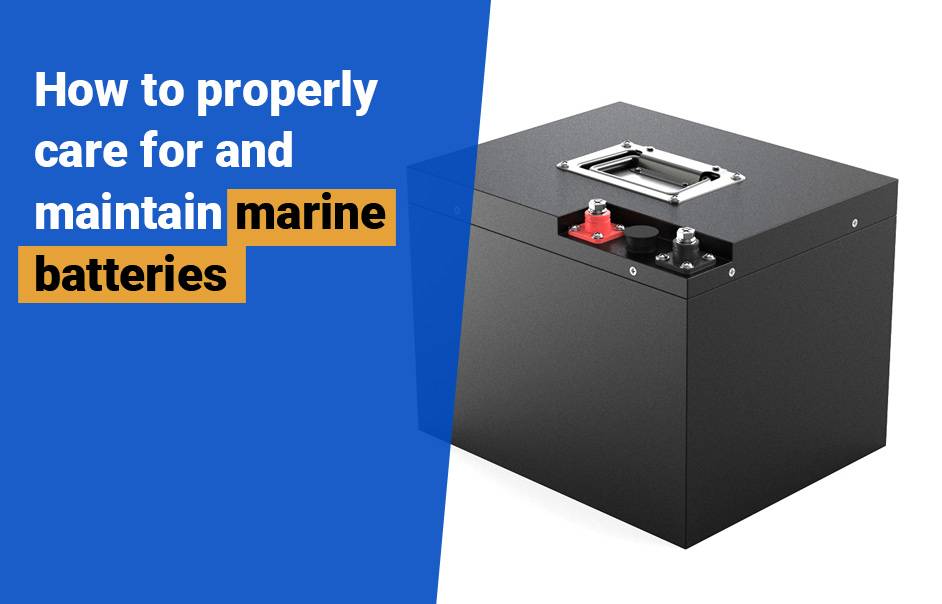
FAQs
Is a marine battery the same as an RV battery?
Marine batteries and RV batteries are often considered interchangeable, with some brands offering hybrid Marine/RV batteries specifically designed to meet the needs of both applications. The key factor in determining if a marine battery is the same as an RV battery lies in selecting a battery that best suits the vehicle’s power demands.
For starting an RV, standard automotive batteries can typically be used as cranking batteries. However, for RV owners who require a battery capable of starting the vehicle and powering home electronics, Dual Purpose Marine/RV batteries such as those from the Duracell Ultra and X2Power lines are recommended.
In cases where large RVs with multiple electronic power demands are concerned, it is common to have two or more batteries in use. While one battery may be dedicated to cranking the engine, Deep Cycle batteries are often chosen to fulfill the power needs of the RV’s living quarters.
Ultimately, the choice between a marine battery and an RV battery depends on the specific requirements of the vehicle and its intended usage. It is essential to select a battery that aligns with the power demands and functions necessary to effectively operate the RV.
Can you use a marine battery charger to charge a car battery?
Yes, you can use a marine battery charger to charge a car battery. These chargers are versatile and can typically handle various types of batteries, including car batteries. While the main difference between a marine charger and a standard charger is ruggedness and waterproofing, the functionality remains suitable for charging car batteries. Many marine chargers are designed to be smart and automatic, meaning they can detect the type of battery being connected and adjust the charging mode accordingly. However, it’s crucial to note that some marine chargers may come with connectors specifically for marine batteries and not for car batteries. To ensure compatibility with both car and marine batteries, look for a charger that offers interchangeable connectors. An example of a model that includes such features is the X2Power SLC10005, which allows for easy use with both car and boat batteries.
Can you use a trickle charger on a marine battery?
Yes, you can certainly use a trickle charger on a marine battery. Trickle chargers are highly recommended for marine batteries, especially during times when the boat is not in regular use or during transportation and storage periods. A high-quality trickle charger, such as the NOCO GENPRO 10×4, can serve not only as a charger but also as a battery maintainer and desulfator. These advanced chargers are designed to be smart and automatic, making them ideal for keeping your boat’s battery healthy in the long run. Onboard chargers, like the X2Power marine chargers, are a convenient choice for marine batteries as they can be permanently mounted and connected to the batteries at all times. This allows for easy charging and maintenance, ensuring that your marine batteries are always ready for your next adventure on the water.
Can you jump-start a car with a marine battery?
Yes, you can jump-start a car with a marine battery, but it is not the most recommended method due to potential risks. While it is possible to use a marine battery to start a car in an emergency, there are better alternatives available. It is advisable to have a proper jump pack or jumper cables in your vehicle for such situations. Using a marine battery may introduce unnecessary risks and could potentially damage the electrical system of your car or truck. It is also important to consider the location of the marine battery, which may not always be easily accessible for jump-starting a car. Therefore, while technically feasible, using a marine battery to jump-start a car is not the most preferred method and should be avoided if possible.
What are some categories of batteries and articles related to marine vehicles available on the website mentioned in the passage?
The website mentioned in the passage offers various categories of batteries, including Deep Cycle Batteries, Lithium Batteries, 6-volt and 12-volt batteries, AGM Batteries, among others. Additionally, it features a range of articles related to marine vehicles such as Boat Battery Isolators & Separators, tips on choosing the best marine battery for your boat, and other marine-specific topics.
What functions of a marine vehicle are reflected in the price point of marine batteries?
The price point of marine batteries reflects various key functions essential for a marine vehicle to operate efficiently and safely. Unlike car batteries designed for quick and strong startups, marine batteries are tailored to endure the unique challenges of being on water, such as constant vibrations and movement. Opting for the correct marine battery not only ensures optimal performance for a range of tasks but also guarantees a high level of quality and precision. This quality and reliability play a crucial role in providing a safe and durable boating experience regardless of the season, contributing to why marine batteries may vary in price based on the functions they serve in marine vehicles.
Can you use a car battery in a boat?
Whether a car battery can be used in a boat, offering valuable insights for boat owners? While it may be tempting to opt for a car battery to save costs, investing in a high-quality marine battery designed for deep cycling is crucial for ensuring optimal performance and longevity of your trolling motor setup. Automotive batteries are not equipped to withstand the harsh conditions that boats often face, potentially leading to the need for more frequent replacements and potential safety concerns. Therefore, choosing wisely and selecting a marine battery specifically tailored for marine use is essential for a reliable and safe boating experience.<
Are marine batteries better than regular batteries?
Using a car battery for your trolling motor may seem convenient, but it is essential to understand the design variances and associated risks to make an informed decision. Marine batteries are crafted for reliable, safe, and efficient operation, offering dedicated performance for marine applications. Opting for marine batteries over car batteries for trolling motors is highly recommended, as they are purpose-built for prolonged use and deep cycling. The design features of marine batteries, such as thicker plates and larger cells, ensure a steady power supply over extended periods, making them ideal for continuous discharging and recharging cycles. By investing in a high-quality marine battery tailored for deep cycling, you guarantee optimal performance and longevity for your trolling motor setup. Selecting the right battery is crucial for ensuring a reliable and safe boating experience. Choose wisely to enjoy seamless operation and peace of mind on the water.
Why is it better to use none of the adapters and kits for batteries, even though they are available?
It is more advisable to avoid using adapters and kits for batteries, despite their availability, as these accessories may not always be the most reliable or optimal solution for efficiently powering devices. By refraining from utilizing such accessories, one can potentially prevent potential issues and complications that may arise from their usage, ensuring a more straightforward and secure power supply for electronic devices.
What are some related articles and resources regarding batteries and battery usage?
There is a wide range of articles and resources available on the topic of batteries and battery usage. Some related articles discuss the dimensions, features, and recommendations for different types of batteries, such as Group 35, 4D, 6D, and 8D batteries. Others provide reviews and recommendations for specific battery models like the DieHard 38232 Advanced Gold AGM Group 34 Battery and the Battle Born 100 Ah LiFePO4 12 Volt Deep Cycle Battery.
In addition to battery-specific articles, there are resources covering various aspects of battery usage and maintenance. Topics include reconditioning car batteries, understanding car battery amps, selecting the best 1000 CCA (Cold Cranking Amps) marine, automotive, and industrial batteries, as well as dealing with scenarios like a car battery dying while driving.
Furthermore, there are additional resources available for battery-related tools and accessories, such as battery backups, UPSs, chargers, and jump starters. Information on cordless tools, electric bikes, scooters, power banks, generators, inverters, and solar panels is also provided for those interested in efficient battery usage across different applications.
What precautions should be taken when using a marine battery in a modern car with advanced electronics?
When considering using a marine battery in a modern car with advanced electronics, it is crucial to ensure that the marine battery is of a comparable size and chemistry to a standard car battery. The marine battery should ideally possess similar or better capacity, CCA (Cold Cranking Amps), MCA (Marine Cranking Amps), and other discharge features to effectively power the vehicle. Properly securing the marine battery in its position within the car, as well as ensuring it can be correctly connected to the vehicle’s electric system, are essential precautions to take.
Given that modern cars are essentially computers on wheels, it is important to be aware that disconnecting or fully discharging the main battery can potentially trigger the car’s alarm system and even immobilize the engine. In such cases, the vehicle may need to be towed to a certified dealership to unlock the engine and resolve the issue. Therefore, it is vital to consider these implications and take appropriate precautions when integrating a marine battery into a modern car with advanced electronics to prevent any unforeseen issues with the vehicle’s operation.
How do battery terminals and hold-down systems play a role in using a marine battery in a car?
In order to use a marine battery in a car, the compatibility between battery terminals and the electrical systems of both the boat and the car is crucial. Battery terminals serve the function of connecting the battery to the electrical system of the vehicle. It is important to note that marine and car battery terminals may differ, but some manufacturers provide models that feature both types of terminals, enabling flexibility in use.
If the battery terminals do not align with the cables of the boat or car, there are special battery terminal adapters available that can facilitate the connection of almost any battery to any cable. Additionally, hold-down systems are essential in securing the battery in place and preventing movement. Should the existing hold-down system not be compatible with the battery, there are various adapters and hold-down kits that can be utilized to ensure a secure fit.
Overall, ensuring that the battery terminals and hold-down systems are appropriately matched and in alignment with the required specifications is key in successfully using a marine battery in a car.
What are CCA and MCA, and why are they important for battery performance?
CCA (Cold Cranking Amps) and MCA (Marine Cranking Amps) are crucial characteristics used to measure a battery’s capacity to deliver high currents, especially in demanding situations. CCA represents the battery’s ability to provide a powerful current in cold temperatures, essential for starting a vehicle in harsh winter conditions. On the other hand, MCA indicates the battery’s capability to deliver currents in marine applications, where reliable power is necessary for marine engines.
These ratings are vital considerations when evaluating a battery’s performance because they directly influence its ability to effectively start an engine. The higher the CCA and MCA values, the more efficiently the battery can perform in challenging situations, ensuring reliable engine cranking and smooth operation. Consequently, understanding CCA and MCA ratings is essential for choosing a battery that fits the specific requirements of your vehicle or marine equipment.
What are the size requirements for batteries on a boat and why is it important to use the correct size?
The size requirements for batteries on a boat typically revolve around fitting properly within the designated space and being compatible with the vessel’s electrical system. It is crucial to use the correct size of battery for several reasons. Firstly, boat batteries are designed with larger casings to provide protection from the marine environment, ensuring their durability and longevity. Attempting to fit a car battery, which is typically smaller and may not have the necessary marine-grade construction, can pose safety risks and potentially damage the vessel’s electrical components.
Moreover, using the appropriate size of battery, such as a deep cycle and trolling motor combination, is essential for the optimal and safe operation of the boat. These specialized marine batteries are specifically engineered to meet the power demands of boats and marine activities, ensuring reliability and performance on the water. Using the wrong type or size of battery can not only lead to potential motor damage but also leave the boat stranded without power, compromising safety and enjoyment while out on the water. Therefore, adhering to the size requirements and using the correct type of battery is crucial for the overall efficiency, safety, and functionality of a boat’s electrical system.
How can using the wrong battery on your boat impact the performance and safety of your marine vehicle?
Opting for a car battery for your trolling motor poses problems. Car batteries lack the durability for constant deep cycling, resulting in a significantly shorter lifespan. Moreover, their quicker discharge under load makes them less suitable for trolling motors. Safety is paramount, especially on water. Inappropriate equipment, like using a car battery, can pose risks, affecting connected electronics on your boat. It’s crucial to prioritize safety when choosing the right battery. Using a car battery for your trolling motor may seem convenient, but understanding the design differences and associated risks highlights the importance of investing in a dedicated marine battery for reliable, safe, and efficient operation.”
Understanding the specific battery requirements of your marine vehicle is crucial to ensure optimal performance and safety while out on the water. Car batteries, although convenient, may not be the best choice due to their limitations in deep cycling and discharge rates. This can lead to a shorter battery lifespan and potential risks to the electronics on your boat. Safety should always be a top priority, and using the right battery, such as a dedicated marine battery, is essential for reliable and efficient operation. By investing in the proper equipment designed for marine use, you can navigate the waters with confidence, knowing that your boat is equipped for both performance and safety.
How does the voltage of a marine battery differ from that of a car battery and why does it matter?
Marine Batteries for Deep Cycling: Marine batteries are specifically crafted for deep cycling, making them ideal for trolling motors. Thicker plates and larger cells enable steady power delivery over extended periods, suitable for continuous discharging and recharging cycles. Additionally, marine batteries are designed with a higher power output compared to car batteries, allowing for more cranks and better performance in marine vehicles.
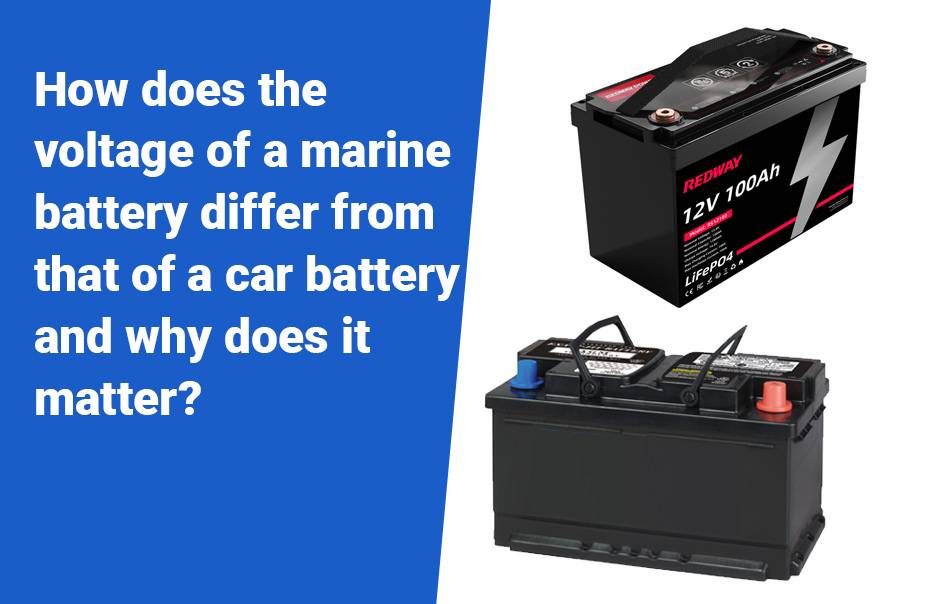
Issues with Using Car Batteries: Opting for a car battery for your trolling motor poses problems. Car batteries lack the durability for constant deep cycling, resulting in a significantly shorter lifespan. Moreover, their quicker discharge under load makes them less suitable for trolling motors. It’s important to note that the voltage difference between marine and car batteries is crucial in ensuring the longevity and efficiency of your equipment.
Safety Concerns: Safety is paramount, especially on water. Inappropriate equipment, like using a car battery, can pose risks, affecting connected electronics on your boat. It’s crucial to prioritize safety when choosing the right battery. Remember, a marine battery’s larger internal plate and housing are specifically designed for better discharging capabilities, making it the optimal choice for marine applications.
Why should you never use a car battery on your boat?
In conclusion, while using a car battery might seem tempting, investing in a high-quality marine battery designed for deep cycling ensures optimal performance and longevity for your trolling motor setup. Different Design Purposes: Car batteries are engineered for short bursts of high energy to start an engine, while marine batteries, designed with deep cycling capabilities, are better suited for consistent, extended power delivery required by trolling motors. It’s crucial to understand the specific design differences between car batteries and marine batteries in order to make an informed decision for your boating needs.
Limited Capacity and Safety Risks: Car batteries have limited capacity, making them susceptible to quick drainage by power-hungry trolling motors. Additionally, the safety risks associated with using a car battery on a boat include inadequate ventilation for boat conditions, potentially leading to gas buildup or corrosive acid leakage. It’s essential to prioritize safety and performance by selecting a marine-grade battery that can meet the power demands of your boat while ensuring a safe and efficient operation.
Voiding Warranties and Insurance Coverage: Using a car battery for a trolling motor may void warranties or insurance coverage, as manufacturers recommend specific marine-grade batteries to ensure optimal performance and safety. By investing in a dedicated marine battery, you can avoid potential warranty issues and ensure that your boat operates reliably and safely. Understanding the importance of choosing the right battery for your boating needs can help you enjoy a worry-free and enjoyable experience on the water.
What factors should be considered when replacing a car battery with a marine battery?
When considering factors for your trolling motor battery, it is crucial to opt for marine batteries over car batteries due to their durability and suitability for extended usage. Furthermore, prioritizing batteries with higher amp-hour ratings ensures sustained power during your fishing excursions. Size, weight, and type are also key considerations – opt for compact, lightweight marine batteries that fit seamlessly into trolling motor compartments. When deciding between FLA, AGM, or Li-ion batteries, assess cost, maintenance, and performance aspects to make an informed choice. By carefully considering these factors, you can ensure your trolling motor operates smoothly throughout all your fishing adventures!

